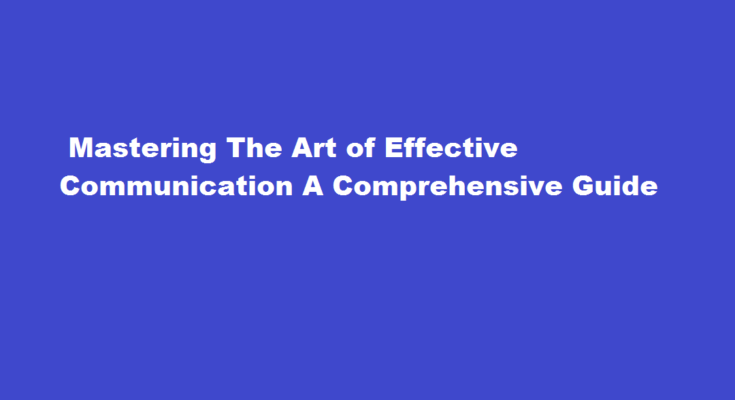Introduction
Effective communication is a vital skill in both personal and professional spheres. It is the cornerstone of building meaningful relationships, expressing ideas, and achieving success. While some individuals may possess innate communication abilities, most people can develop and refine their skills through conscious effort and practice. In this article, we will explore key strategies and techniques to enhance your communication skills, enabling you to convey your thoughts, listen actively, and engage in fruitful interactions with others.
The Power of Listening
Communication is not just about speaking; it also involves active listening. Listening attentively demonstrates respect, encourages understanding, and fosters stronger connections with others. To improve your listening skills, maintain eye contact, show genuine interest, and avoid interrupting. Additionally, practice empathetic listening by putting yourself in the speaker’s shoes and attempting to understand their perspective. This will allow you to respond appropriately and foster a positive environment for open dialogue.
Mastering Verbal Communication
Verbal communication is the foundation of effective interaction. To enhance your verbal communication skills, focus on clarity, coherence, and conciseness. Clearly articulate your thoughts, use appropriate vocabulary, and structure your sentences logically. Pay attention to non-verbal cues such as body language and tone of voice, as they can significantly impact the message you convey. Practice active voice, avoid jargon, and adapt your communication style to suit different audiences, ensuring your message is easily understood and well-received.
The Art of Non-Verbal Communication
Non-verbal communication, including facial expressions, gestures, and posture, plays a significant role in conveying messages accurately. Enhancing your non-verbal communication skills can greatly improve your overall communication effectiveness. Maintain an open posture, make eye contact, and use appropriate hand gestures to enhance your verbal message. Additionally, be aware of cultural differences in non-verbal communication, as certain gestures may have varying meanings across different cultures.
Developing Emotional Intelligence
Emotional intelligence is the ability to recognize and manage emotions, both in oneself and others. It plays a crucial role in effective communication, as it helps build rapport, empathy, and understanding. To develop emotional intelligence, practice self-awareness by recognizing and understanding your own emotions. Cultivate empathy by actively listening and attempting to understand the emotions of others. Finally, regulate your emotions by controlling impulsive reactions and responding thoughtfully. Developing emotional intelligence will enable you to navigate difficult conversations and build stronger relationships.
Harnessing the Power of Written Communication
In today’s digital age, strong written communication skills are essential. Whether it’s composing emails, reports, or social media posts, the ability to express ideas clearly and succinctly is critical. Practice writing with a focus on organization, grammar, and punctuation. Tailor your writing style to the intended audience, using appropriate tone and language. Edit and proofread your work meticulously to ensure clarity and coherence. Consider seeking feedback from others to refine your writing skills further.
Frequently Asked Questions
What is the most important communication skill that you can develop?
Listening is one of the most important communication skills that we can acquire because it’s the primary way that we develop relationships, understand others, and build trust.
What are the major questions which a good communication plan answers?
You guessed it — a Communications Plan, and one that can be developed as easily as answering just 6 key questions ‒ why, who, what, when, how, and how well.
Conclusion
Developing effective communication skills is an ongoing process that requires conscious effort and practice. By improving your listening skills, mastering verbal and non-verbal communication, developing emotional intelligence, and harnessing the power of written communication, you can become a more effective communicator. Remember, effective communication is not just about speaking, but also about actively listening, understanding others, and adapting to different situations. As you continue to refine your skills, you will witness the positive impact it has on your personal relationships and professional endeavors.
Read Also : Developing Analytical Skills Unlocking The Power of Critical Thinking



